#mohammed al jolani
Explore tagged Tumblr posts
Text
His face reminds me more of Castro oddly enough even though he has little in common with Castro. I guess it's the beard.
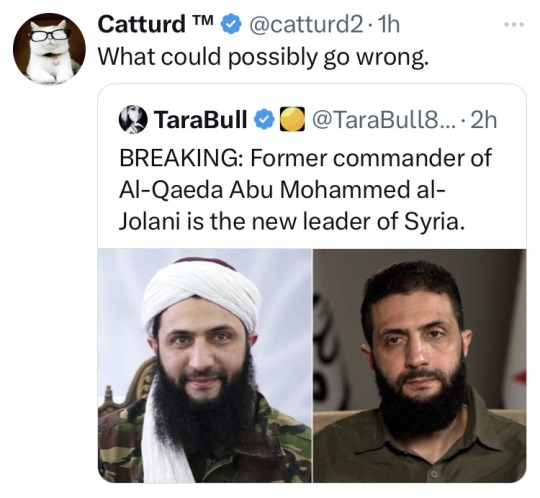
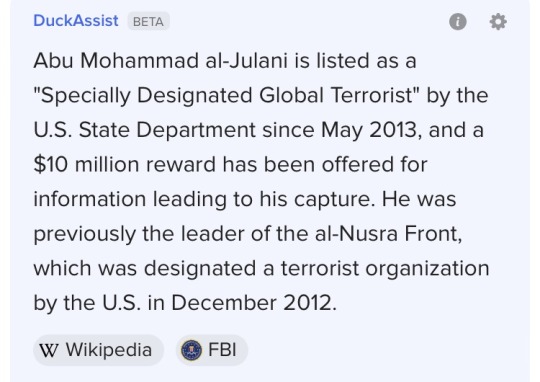
Yeah. What could go wrong.
125 notes
·
View notes
Text

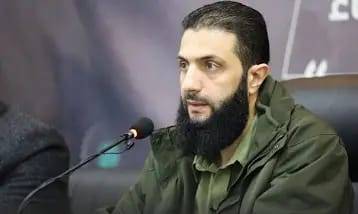







A-Sham.
34 notes
·
View notes
Text
by Orli Peter
The terrorists exploit Western values by weaponising our emotional empathy. Through graphic imagery and tales of victimhood, they provoke “pain empathy”, the visceral emotional reaction to witnessing suffering. Our brains are wired to respond more deeply to the image of a single suffering child than to statistics about millions of people, a phenomenon known as the “identifiable victim effect”. Studies reveal that small charities can raise more money than bigger ones simply by showcasing such poignant imagery. These images involuntarily affect our brain functioning. With exposure to these images, we respond with emotional empathy. The more emotionally empathic we already are, the more vulnerable we are to its weaponisation.
Hamas and its sympathisers skilfully exploit pain-empathy circuits in the brain, flooding the media with real or manipulated images of dead children, even misrepresenting gruesome scenes from other wars – including the Shoah in cases of “Holocaust inversion” – as Palestinian casualties of Israel. Terror leaders have openly stated that higher death tolls benefit their cause. They work to increase civilian casualties by broadcasting messages in mosques and on social media, instructing Gazans to ignore Israeli evacuation warnings, and by physically blocking evacuations through roadblocks or even shooting those attempting to flee. In a blatant display of its anti-humanitarian values, Hamas increases civilian casualties in order to weaponise Western pain-empathy to gain support for their agenda.
But while the militants centre their narrative around victimhood to promote pain-empathy in Western audiences, they simultaneously promote a narrative as victor to excite their base. For example, militant propagandists sent the Western media images of Gazan suffering, while Hamas broadcast GoPro videos of torture and murder to their supporters to invigorate them. They highlighted their victimhood and suffering under the “occupation” of the “colonisers”. They played it brilliantly.
During the 2008 war in Gaza, the international media focused on gruesome and graphic coverage of casualties, sometimes called “war porn”, and transformed a complex conflict into a global emotional spectacle. CNN and the BBC amplified sympathy for Hamas, illustrating the devastating effectiveness of such psychological strategies.
While emotional empathy fosters connectedness, it can also have negative consequences, such as lying to benefit our group, prioritising our group’s interests over principles of justice and connecting so much to another group’s priorities that our empathy is self-destructive.
The ability to truly empathise – combining emotional resonance with cognitive understanding – requires a nuanced, fact-based model of others’ motivations. Without this balance, our empathy becomes a tool for manipulation. What can we do? We must refine our cognitive frameworks to resist propaganda, anchoring our emotional responses in accurate understanding. While individual stories of suffering evoke deep empathy, they must be rescaled to reflect the true scope of the issue. Similarly, the compelling imagery of “blazer-wearing” revolutionaries for peace must be critically examined within the broader context of extremist violence and manipulation.
#hamas#gaza#terrorists#media bias#western values#blazer wearing revolutionary#mohamed al jolani#cognitive empathy
26 notes
·
View notes
Text
Vladimir Putin backed Syria's bloodthirsty dictator Bashar al-Assad for almost the entire quarter century he has ruled Russia. Putin placed Russian bases in Syria and used his military there against civilian populations.
Now that al-Assad has fled to Moscow and the Russia bases in Syria are emptying, Ukraine sees an opening.
Ukrainian Foreign Minister Andrii Sybiha paid a visit to Damascus for talks with Syria's new leader. Ukraine, a major agricultural power, has already sent hundreds of tons of food to Syria since the fall of al-Assad.
Syria’s de facto ruler Ahmed al-Sharaa held talks on Monday with a senior Ukrainian delegation led by Foreign Minister Andrii Sybiha, the Syrian state news agency (SANA) reported, as Kyiv moves to build ties with the new leadership in Damascus. SANA provided no immediate details about their talks, held in Damascus, but Ukrainian President Volodymyr Zelensky said last Friday his country had sent its first batch of food aid to Syria, which is traditionally a close ally of Russia. Zelensky said that 500 metric tonnes of wheat flour were already on their way to Syria as part of Kyiv’s humanitarian “Grain from Ukraine” initiative in cooperation with the United Nations World Food Programme. Ukraine, a global producer and exporter of grain and oilseeds, has said it wants to restore relations with Syria following the overthrow of President Bashar al-Assad and his flight into exile in Russia. [ ... ] The ousting of Assad by al-Sharaa’s Islamist group, Hayat Tahrir al-Sham (HTS), has thrown the future of Russia’s military bases in Syria – the Hmeimim airbase in Latakia and the Tartous naval facility – into question.
#syria#bashar al-assad#vladimir putin#russia#hts#ahmed al-sharaa#abu mohammed al-jolani#ukraine#andrii sybiha#volodymyr zelenskyy#grain from ukraine#سوريا#روسيا#بشار الأسد#فلاديمير بوتن#جرائم الحرب#حبوب من أوكرانيا#اوكرانيا#أحمد الشرع#أبو محمد الجولاني#هيئة تحرير الشام#владимир путин#добей путина#путина в гаагу!#україна#андрій сибіга#володимир зеленський#сирія#загроза продовольчій безпеці світу#слава україні!
16 notes
·
View notes
Text
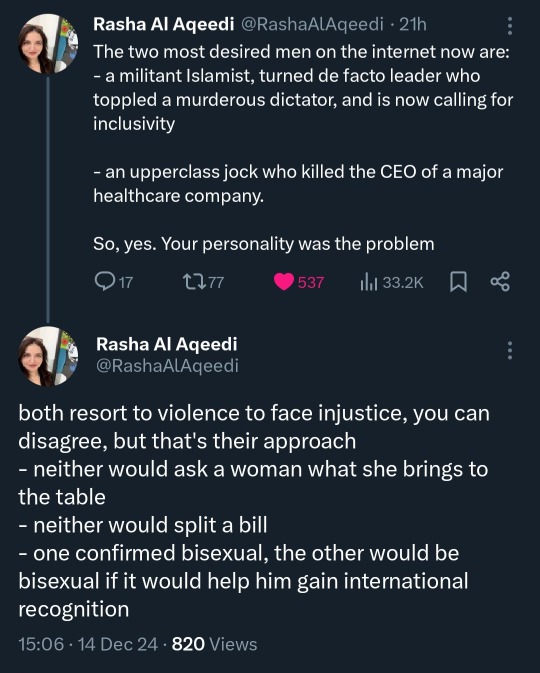
Manosphere is gonna be in utter disarray.
10 notes
·
View notes
Text
Though I've always been pretty familiar with the general conflict of Syria, I've never known all the moving parts and forces involved. I feel like it's the same for a lot of people, so here's what I've learned:
Bashar al-Assad is bad because of the whole putting children and innocents in prison - that one is pretty cut and dry. His reign was terrible and countless Syrians had to flee the country - it's with great celebration that he has fled to Moscow and Syrian refugees can return to their homes (though a lot of those homes are reduced to rubble in light of the conflict). Seemingly, his power only remained as long as Hezbollah and Russia supported him; with both forces were busy with the Ukraine and Israel respectively, he lost a lot of his defensive power. Armenia, who initially backed the Assad regime (which has a lot to do with Assad recognising the Armenian genocide and siding against Türkiye) has pulled their embassy out of Damascus as Iran's embassy in Damascus was stormed by rebel groups (though it may have reopened a few hours ago as of writing???).
Erdoğan's motives and by extension the TFSA (Free Syrian Army) is shady because of Türkiye and their tendency to casually commit genocide (re: Armenian genocide and Kurdish cultural cleansing); though Erdoğan has put blockades on Israel in light of October 7th, it's unclear how much of that is because Israel is allies with Armenia (Armenia gets 4.8% of its imports from Israel, while Israel receives 7.1% from Armenia) as opposed to earnestly siding with the Palestinians. Türkiye's involvement in NATO and the UN means that a lot of the time it's acting in Western interesting (AKA, the USA) and Western interest in the Middle East is NEVER A GOOD THING!!! In other words, Erdoğan is likely not acting with the interest of Syrian liberation in mind - just that he doesn't like Assad (and is aligning himself against Iran, Russia and Armenia) and doesn't like the prospect of an independent Kurdistan region in Syria.
Another player in the game is Kurdistan - the Syria Defense Force or SDF or the US-backed People's Defense Units (YPG) - which might be the most complicated to me tbh. They are considered a terrorist group by Türkiye; though of course Türkiye has a complicated relationship with Kurdistan - having a strong trade relationship with the autonomous region in Iraq, yet fighting against the YPG (since Türkiye doesn't want an autonomous Kurdish nation on their border) and PKK (who fight against Kurdish oppression in Türkiye). Kurds in general, but specifically the Kurdish Region in Iraq just sorta want autonomy - though to get that autonomy they have aligned themselves with Benjamin Netanyahu and Israel is the only country in the region to recognise Kurdistan as an independent state, though many others of Kurdistan - especially in Syria - have also expressed support for Palestine as an independent state, acknowledging that the Palestinian genocide is the same which Kurds experienced in Turkey. Hafez al-Assad of Syria has also supported certain Kurdish rebellions in the past, specifically in Iraq, and the SDF also allied itself with Bashar al-Assad and Putin against Türkiye, an alleged "painful compromise" to protect the Kurdish population of Syria - even though Assad would never recognise Kurdistan as autonomous (especially not within de facto Syria).
It'd be remiss not to mention Hay'at Tahrir al-Sham or the HTS which toppled Assad and looks like Abu Mohammad al-Jolani is in charge of Syria atm as the transitional government. He has stated he will lead Syria "moderately", and he has cut ties with al-Qaeda. Despite the look, I am not reflexively against a person just for having ties to al-Qaeda (fuck it, even the Taliban or any other Islamic fundamentalist group in the region) because while I disavow these groups and what they stand for, it's hard to do the same for the people part of and supporting those organisations (the whole 'be kind to individuals, but be ruthless to institutions' schtick). Simply put, there's a lot of complicated parts to how terrorists groups like these form in the first place - including the simple fact that you can't bomb your way into peace, as the continued bombing of civilians and residential areas and upheaval of peaceful civilian life only festers radicalisation and anti-USA sentiment and has only bolstered support for terrorist groups who 'protect' civilians from Western bombs at the very least (I know Medhi Hasan has written a few essays on how extremist groups form and how to counter them which cuts through Western propagandic Islamophobic bullshit, if you wanna read into it more). Jolani pretty much said as much himself in an interview with PBS Frontline in 2021: [Jolani] "This issue needs a closer look, we need to consider the recent history of the region. […] We're talking about a region ruled by tyrants - by people who ruled with an iron fist. And this region is surrounded by numerous conflicts and wars. There are thousands who joined al-Qaeda. But why did they join al-Qaeda?" [Jolani] "We were against killing innocent people. I wasn't alone, many of us with a conscience and a true understanding of Islam were against the killing of any innocent person." [Martin Smith] "Americans would say they came to liberate Iraq, and had you not resisted - constant car bombings, IEDs, snipers - there would not have been so much bloodshed." [Jolani] "And if there was no American presence, there would not have been resistance." A lot of his political radicalisation came from the Israeli invasion of the Golan Heights and Julani wanting to "[Defend] a people who are oppressed by occupiers and invaders." Also according to this documentary, Julani, or at least the HTS, has a bit of a history with brutal methods including the torture of prisoners, not to mention his involvement with the Jihadist movement spells uncertainty for Syria's Druze, Christian and Catholic population.
Netanyahu of course is another factor. Immediately after Assad fell, Israel started striking Damascus and invading the buffer region in the Golan heights, exploiting the instability for their own expansionist goals. The UN has protested against this invasion, but like usual they will do nothing to stop it, like even Germany who has held steadfast support of Israel is like "bro wtf". Just yesterday, news broke that Israel dropped a bomb on Syria that was picked up on the fucking Richter scale because the blast was enough to cause a seismic earthquake.
Lemme know if I missed or misrepresented anything (i'll correct the post n' everything) - the conflict is still unfolding n' all and some things are unclear. Whatever happens next, hopefully it'll be at least a little better for the Syrian people, and if not for them then for their children.
#whys it so complicated whar#politics#issues#social issues#social commentary#my post#middle east#syria#iran#russia#turkey#kurdistan#israel#al jolani#abu mohammed al golani#recep tayyip erdoğan#us politics#history#idk what tags to us#so just using them all#al jazeera#israel is committing genocide#news#world news#long post
3 notes
·
View notes
Text
so... censoring germany's foreign minister because she didnt wear hijab to the meeting with the jihadist regime in syria is bad, but jolani sending suicide bombers to markets filled with civilians, or managing underground torture dungeons, or working with isis, or going after and murdering any non sunni muslim in syria, these are all fine?
1 note
·
View note
Text
Kurdish forces fight back against Turkish-backed rebels amid clashes in northern Syria
The SDF launched a counter-offensive against the Turkish-backed SNA to reclaim areas near Syria’s northern border. Clashes have intensified since Bashar al-Assad’s fall. ADVERTISEMENTThe Kurdish-led Syrian Democratic Forces (SDF) launched a counteroffensive Tuesday against the Ankara-backed Syrian National Army to take back areas near Syria’s northern border with Turkey.Since the fall of the…
0 notes
Text
喬拉尼是誰?敘利亞叛軍領袖如何從頭巾聖戰士成為西裝革履的革命家
敘利亞一夜變天,反抗軍在閃電攻勢中占領首都大馬士革,總統阿塞德據稱已流亡莫斯科,敘利亞經歷13年內戰後讓人震驚的形勢轉變。敘利亞內戰始於阿拉伯之春,後來升級為多國參與的血腥衝突,涉及國內反對派、極端主義派別,還有包括美國、伊朗和俄羅斯在內的國際力量,超過50萬敘利亞人喪生,幾百萬人逃離家園。 十多年來,各個派別一直試圖推翻阿塞德,而反叛軍在不到十天的時間裡席捲整個國家,外界開始猜測領導反叛軍奪取大馬士革的喬拉尼(Abu Mohammed al-Jolani)究竟是誰。 喬拉尼曾是敘利亞內戰中蓋達組織的分支指揮官,一直是個神秘人物,在阿塞德政權被他推翻後,他也保持低調。他是反抗軍中最具辨識度的人物,自2016年與蓋達組織斷絕關係、重新塑造組織形象以來,他逐漸走入公眾視野,並在13年內戰後領導反叛軍推翻阿薩德。 以本名夏拉(Ahmed…
0 notes
Text
This Week in Prophecy: Assad Regime Out in Syria, California Quake
This Week in Prophecy: Assad Regime Out in Syria, California Quake
Isaiah 17:1 This is the burden against Damascus: “Behold, Damascus is no longer a city; it has become a heap of ruins. The Assad regime and rule in Syria is over after 50 years. The Syrian Regime has fallen as Damascus and the SAF surrendered to rebel factions. The last remaining SAF ‘control’ along the Mediterranean coast remains to be formally taken over. The SNA have carried out attacks on…
#Abu Mohammed al Jolani#Al Qaeda#Bashar al Assad#California#Damascus#Iran#Israel#Moscow#President Recep Erdogan#quakes#Queitra#Russia#Syria#Trump#Turkey
0 notes
Text
10 points on the fall of Bashar al-Assad’s Syria from Vijay Prashad
1. The Syrian state had been devastated by the war from 2011 to 2014, and then by the sanctions placed on the country by the United States and its allies. The Syrian Arab Army (the official state army) had never fully recovered in the aftermath of the major fighting and was incapable of taking back the main cities of Hama, Homs, and Aleppo.
2. The Israeli bombardment of Syrian military facilities had weakened the Syrian armed forces’ logistical and ordinance capabilities. These attacks had been sustained and painful for the Syrian armed forces.
3. Israeli invasion of Lebanon and the assassination of Hezbollah leader Sayyed Hassan Nasrallah had weakened the ability of Hezbollah to operate even within Lebanon’s south, which forced the recent ‘ceasefire’ agreement with Israel. This demonstrated that Hezbollah was not in any position to enter Syria again to defend the Syrian government against any armed incursion on the Hama to Damascus road (highway M5).
4. The attacks on Iranian supply depots and military facilities in Syria as well as the attacks by Israel on Iran had prevented any build up of Iranian forces to defend the Syrian government. The weakening of Hezbollah also weakened Iran’s role in the region.
5. The nearly three years of conflict in Ukraine had certainly denied Syria the ability to call upon further Russian assistance for the protection of Damascus or for the Russian naval base in Latakia.
6. Therefore, Syria’s government no longer had its Iranian and Russian military allies for assistance against the reinforced rebels.
7. The Hayat Tahrir al-Sham, formed in 2017 out of the al-Qaeda formations, drew together various military forces from Turkey to the Uyghurs – with a large number of other al-Qaeda influenced fighters – and built up its forces in Idlib over the past decade. HTS has received aid and support from Turkey, but also covertly from Israel (this information came to me from a highly placed intelligence official in Turkey).
8. What will the new HTS-led government do regarding the many social minorities in Syria? What will the new HTS-led government do regarding the Golan Heights and Israel? How will the new HTS-government regard the Israeli military incursion in Quneitra?
9. This story is not over yet. There will be much further unrest in the country led by ISIS as well as the Kurdish groups in the north; already Turkish-backed groups are in combat against the Kurdish YPG (People’s Defense Units) and PKK (Kurdistan Workers’ Party) forces in Manbij; US forces are already in eastern Syria, where they say that they will remain as a buffer against ISIS (and will therefore retain control of the oil); Israel also announced that it took over the Golan buffer zone. There will be tension between the governments of Turkey and the US regarding what the new HTS-led government must, and must not do.
10. I hope very much that the statements made by Abu Mohammed al-Jolani, that retribution must not be the new culture, will come true. The real fear is regarding the treatment of the minority populations. There is no word yet if the militia groups in Iraq will enter Syria. Much of this depends on what happens to places such as the Sayyida Zaynab shrine in Damascus.
130 notes
·
View notes
Text
Syrian President Bashar al-Assad faces the most substantial threat to his regime in years, after rebels captured Aleppo—one of the country’s largest cities—last week, along with dozens of other towns and villages, in a surprise assault.
The move on Aleppo followed a Nov. 27 offensive by Hayat Tahrir al-Sham (HTS), an opposition militant group and former al Qaeda affiliate that controls much of Syria’s Idlib province, which borders Aleppo province. Aided by locally manufactured kamikaze drones, HTS appears to have caught Assad’s forces off guard, prompting them to retreat from vast areas that are now under the group’s control. Both sides have already suffered significant losses, with at least 446 combatants and civilians killed since Nov. 27, according to the Syrian Observatory for Human Rights.
More than 14,000 people have been displaced due to the recent violence, according to local aid group Violet. But, for the first time in eight years, many regime dissidents are returning to towns and villages that are now under HTS control.
The Syrian civil war began in 2011 after Assad’s regime violently repressed pro-democracy protesters, triggering a conflict that has so far claimed more than half a million lives and displaced over 7 million people. Aleppo was a major opposition stronghold until 2016, when a Russian air bombing campaign retook the city for the Assad regime.
HTS leader Abu Mohammed al-Jolani has instructed his fighters to protect all civilians, including Christians, as well as Syrian regime soldiers who surrender, according to Idlib-based journalist Fared al-Mahlool. Following its split with al Qaeda around 8 years ago, HTS has sought to rebrand itself as a more moderate force than its erstwhile benefactor. Now, many residents of newly captured areas are uncertain what life under HTS control might entail.
Recent escalations in northwest Syria come as Assad’s main international supporters are preoccupied with their own conflicts. Russia is prioritizing its war in Ukraine, and both Iran and its proxy Hezbollah, in Lebanon, have been significantly weakened in fighting with Israel. Still, Russian and Syrian airstrikes targeted Idlib and Aleppo provinces over the weekend, while Iranian-backed militias from Iraq—including Kataib Hezbollah and Fatemiyoun—recently crossed into Syria, according to Al Arabiya, a Saudi Arabian news channel.
“Since Sunday, the bombings are constant,” Mahlool said. “Several schools and clinics in Idlib province have already been targeted.”
On Dec. 1, an airstrike hit Aleppo University Hospital, killing at least 12 people and injuring dozens more. The strike also damaged one of Violet’s ambulances, said Yemn Sayed Issa, the media and communication coordinator with the aid group. That same day, airstrikes targeted Idlib University Hospital, Ibn Sina Hospital, Idlib’s National Hospital, and the Idlib Health Directorate. And, according to Issa, a Soviet-era warplane struck a camp for displaced people near Ma’arrat Misrin, a town just north of central Idlib, killing at least seven civilians, including five children and two women. Violet’s medical team is responding to the attacks.
“It’s extremely dangerous for everyone. Our medics and ambulances head out daily, but constantly fear being targeted,” Issa said, adding that Aleppo—home to around 2 million people—is now critically short on essentials like bread, water, fuel, and medical supplies, which had previously been shipped from other regime-held areas.
“Everything is coming from Idlib now, but it’s difficult. The humanitarian situation is tragic. People are having to find shelter wherever they can,” Issa said. “In the town of [Darkush], for example, a public swimming pool has been turned into a temporary shelter for people who have fled their villages. Most displaced families have been forced to seek shelter in open fields and farmland, without any proper shelter or basic facilities.”
HTS’s advance means Aleppo is under opposition control for the first time in eight years. The front line had remained frozen since Russia and Turkey brokered a cease-fire deal in 2020. The two countries back opposing sides in Syria.
Russia, along with Iran and Hezbollah, are Assad’s key allies, while Turkey supports the Syrian National Army (SNA), a coalition of opposition groups—excluding HTS—that fights the Assad regime and Kurdish forces such as the People’s Defense Units (YPG) and the Kurdistan Workers’ Party (PKK). Turkey considers the latter two groups to be terrorist organizations.
Since the recent rebel offensive, Assad’s regime has effectively abandoned areas within Aleppo province and left them under Kurdish control. The SNA continues to push the Kurdish groups further east. On Dec. 1, the SNA captured the strategic town of Tel Rifaat, which is located between Aleppo and the Turkish border. For the past eight years, the area had been under YPG and PKK control—a significant national security concern for Turkey.
The relationship between HTS and the SNA has long been tense; HTS has sought control over SNA-held areas and the SNA distrusts HTS for numerous reasons, including ideological differences. But both groups share a common goal.
“The priority is to fight the regime,” said Orwa Ajjoub, a doctoral candidate at Malmo University in Sweden who researches Islamist groups in Syria. “I’ve spoken with people who are sworn enemies of HTS to this day, but now they’re putting their differences aside to fight the regime. HTS is leading these efforts. When the dust settles, we’ll see how these diverse groups manage to resolve their disagreements.”
Turkey has its own troops in Syria, primarily in Idlib, Afrin, and other areas east of the Euphrates River, mainly as part of its operations against the PKK and YPG. Around 900 U.S. troops are also in the country; mostly concentrated in northeastern Syria, they support counter-terrorism operations against the Islamic State.
Analysts have speculated over whether Turkey—which is keen to reduce the power of the PKK and YPG—gave HTS the green light for the operation. Turkish Foreign Minister Hakan Fidan, however, said that it would be “wrong” to try to chalk the current situation in Syria up to external intervention.
Turkish President Recep Tayyip Erdogan tried to mend relations with Assad in July, following a deterioration of ties throughout the war. Yet Assad insisted that Turkish forces must fully withdraw from Syria for him to negotiate with Erdogan—a request Turkey is unwilling to meet due to its own national security concerns.
Speaking with U.S. Secretary of State Antony Blinken on Dec. 1, Fidan stressed that Turkey opposes instability in the region and reiterated the importance of reducing tensions in Syria. Iranian Foreign Minister Abbas Araghchi arrived in Turkey on Dec. 2 to discuss the situation in Syria. “Recent developments show once again that Damascus must reconcile with its own people and the legitimate opposition,” Fidan said at a joint news conference with Araghchi. “Turkey is ready to make all the necessary contribution toward this.”
Whether Turkey knew about it or not, “this operation is definitely a win for Turkey,” Ajjoub said. U.S. President-elect Donald Trump has spoken about potentially withdrawing the remaining U.S. troops in Syria, which could create a power vacuum in the region. “Having more leverage in Syria before Donald Trump takes office could be significant for Turkey,” Ajjoub said.
12 notes
·
View notes
Text
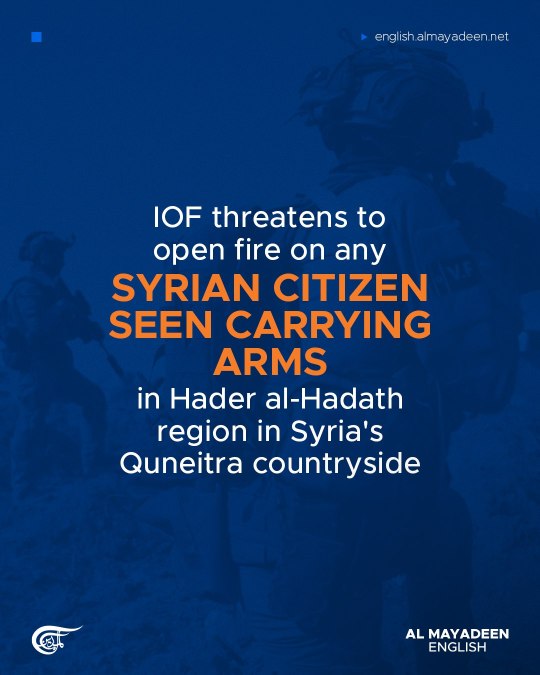
(Al Mayadeen) "Israel" is threatening Syrian citizens whose lands they occupied as the Israeli occupation forces continue to move deeper into Syrian territory as part of the occupation's expansion in the region.
"Israel" continuously expressed a negative attitude towards Bashar al-Assad during his presidency of Syria, yet despite the new administration's assertion of wanting peace with the occupation, the latter has advanced further into Syrian territory.
On Friday, Israeli Foreign Minister Gideon Sa'ar described the new Syrian leadership, led by Ahmed al-Sharaa (Abu Mohammed al-Jolani), as a "terrorist gang that was in Idlib and took control of the capital, Damascus, and is not a stable government."
6 notes
·
View notes
Text
Joshua Keating at Vox:
The early days of the uprising against Bashar al-Assad’s Syrian regime — which came to a stunning end this weekend after 13 long years of civil war as rebel forces entered the capital of Damascus and Assad fled into exile — were defined by two famous pieces of graffiti. The first was written by a group of teenage boys on a school wall in early 2011 in the city of Daraa. Inspired by the Arab Spring protests then seemingly sweeping away the old order in longtime dictatorships like Tunisia, Egypt, and Libya, they wrote, “You are next, doctor,” referring to Assad, who had trained and worked as an ophthalmologist in London in his early years before returning to take over the family business of ruling Syria with an iron fist. The boys were then arrested and tortured by the regime’s security forces, an event credited by many with sparking the mass protest movement against Assad.
The message proved to be overly optimistic: Assad didn’t flee and he didn’t compromise, instead opting to crush the uprising by force, leading to a civil war that would kill as many as half a million people and displace millions more. The second graffiti message was a slogan scrawled by pro-regime militias throughout the country in the early days of the uprising: “Assad or we burn the country.” The phrase signaled the regime’s complete unwillingness to compromise with its enemies and the lengths it would go to stay in power. Over the past week, even as the rebels took the ancient city of Aleppo on November 30 and began streaming down the highway south toward Damascus, it still seemed far-fetched that the Syrian regime would fall — that a family that had been in power since Bashar’s father Hafez al-Assad carried out a coup 54 years ago and was willing to go so far as to use chemical weapons on its own people and reduce its own cities to rubble to preserve that power would simply crumble in a matter of days.
But that’s exactly what happened: As the rebels advanced, there were numerous reports of government forces simply abandoning their positions and discarding their uniforms. The Russian government says it has offered Assad and his family asylum. US officials say they have not confirmed that Assad is in Russia, but have no reason to doubt it.
[...]
The new rulers
Attention will now turn to Syria’s new rulers and how they will govern. Abu Mohammed al-Jolani, the HTS leader, has said all the right things, calling on its supporters to avoid vengeance against regime supporters. For now, he is leaving Assad-appointed Prime Minister Mohammed Ghazi al-Jalali in place until a transitional government is formed. On Saturday, a few hours before Assad’s overthrow, Vox asked Mouaz Moustafa, executive director of the US-based Syrian Emergency Task Force, what a transitional government could look like. He suggested that UN Resolution 2254, adopted back in 2015 but never implemented, could provide a road map: It calls for a Syrian-led political process facilitated by the United Nations leading to new elections within 18 months.
In the coming months, we’ll see whether Jolani, the former al-Qaeda fighter with a $10 million price on his head from the US government, is really the pragmatic pluralist he now says he is, and assuming he is, whether he’s capable of keeping together an ethnically and religiously diverse country, one awash with weapons, various armed groups, and traumatized by decades of dictatorship and war. A big question mark is how Damascus’s new rulers will contend with the Kurdish-ruled northeast corner of the country, particularly if the incoming Trump administration follows through on plans from his last term to remove US troops from the region. There have already been concerning reports in recent days of clashes between Kurdish forces and the Turkish-backed SNA. On Saturday, Trump posted on Truth Social that the offensive in Syria was “NOT OUR FIGHT” and that America “SHOULD HAVE NOTHING TO DO WITH IT.” Beyond these questions, Assad’s fall should be a reminder of some important facts. One, governments and analysts continue to be extremely bad at assessing the strength of non-state militant groups like HTS, their ability to launch major offensives, and the ability of governments to resist them. [...] Over the past few years, the world had all but decided that Assad had won the civil war. Regional governments that had spent years trying to topple him were welcoming him back into the fold, while the US was moving on to other priorities. If the last few days teach us anything, it’s that governments like Assad’s can often be more brittle than they appear from the outside, and it just takes a strong push to knock them over. For all the very justified concern and caution about what lies ahead for Syria, that should be some cause for optimism.
With the fall of the Assad regime in Syria, what will be next for the nation as it charts a post-Bashar course?
4 notes
·
View notes
Text
Syrian Christians Protest Presence Of Foreign Jihadists After Christmas Display Burned
by Tyler Durden | Dec 25, 2024
Starting Monday night and into Tuesday, large demonstrations broke out in Christian areas of Damascus and other parts of Syria over the continued presence of foreign jihadists in the country.
The ruling Hayat Tahrir al-Sham (HTS) has vowed to protect the sizeable non-Muslim communities of Syria (Christians, Alawites, and Druze) following the overthrow of the secular-leaning President Assad and his Baath government, but deep fears have remained that an Islamic state based on Sharia law will emerge.
HTS Abu Mohammed al-Jolani is currently trying to appease Western and external backers by saying all the ‘right things’ in public—but Christians in particular are deeply fearful given that since the jihadist takeover of the country there have been several acts of anti-Christian vandalism and attacks.
Under the prior Assad government, Christians and others had a high degree of religious freedom. Churches would sound bells on special holidays, Christmas lights and decorations would be prominent in December, and special festivals would often take over entire streets and neighborhoods in celebration.
The pre-war Christian population was commonly estimated to be ten to twelve percent of the population, but since 2011 many have fled. Christians have also been killed or kidnapped over the years by Western and Gulf-backed militants, including priests and two bishops who were Christian leaders in Aleppo.
3 notes
·
View notes
Text
Holy fuck... it actually happened. And just a couple years after the Arab League welcomed al-Assad back into the fold and by extension wrote the obituary on the Free Syria movement.
Now there's plenty of reason to look at HTS and Jolani with more than a hefty but of suspicion. Some goes for wondering how this tacit Turkish-backed takeover is gonna interact with Rojava. Or if there will be punitive actions that risk fueling sectarianism.
But for now, there is a potential new beginning for Syrians. Especially those who have been displaced. And those finding their loved ones freed from prisons.
Ultimately, today is about them.
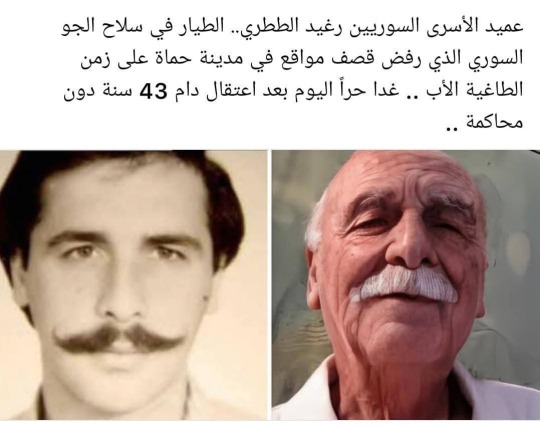
9 notes
·
View notes